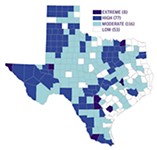EPA to TCEQ: Too Much 'Flexibility'
How flexible permits weaken the Clean Air Act
By Katherine Gregor, Fri., May 28, 2010
Both environmental groups and industry are unhappy about the fact that the state rules have remained in a gray area for many years, out of compliance with federal law. In August 2008, the Business Coalition for Clean Air Appeal Group, the Texas Association of Business, and the Texas Oil and Gas Association sued the EPA in federal court to compel it to finally decide whether all of the state's 1995 SIP revisions were legal. The Environmental Integrity Project filed related citizen petitions in January and August 2009. The EPA responded and reached an agreement in July 2009 on a schedule of final decisions on the Texas air permitting program.
What do Texas air permitting practices allow that the EPA is expected to disapprove? Under federal law, when older plants grandfathered from initial Clean Air Act compliance are updated or changed in any way, the tougher emission rules kick in. Any modification to a plant should require a new permit. That, in turn, triggers the requirement to upgrade to modern standards – what the EPA calls the "best available control technology." But Texas allows industry to avoid the permits and the upgrades, as long as a facility stays under its overall "cap" – as self-reported and never independently monitored. It also allows industry to avoid giving public notice of changes, which federal law requires.
The EPA is now reviewing a thick stack of complaints against TCEQ that piled up during the Bush administration. All industrial air-quality monitoring, measuring, reporting, and noticing is so lax in Texas that nobody fully knows what's being emitted by permitted plants – even the industries themselves.
Got something to say on the subject? Send a letter to the editor.








